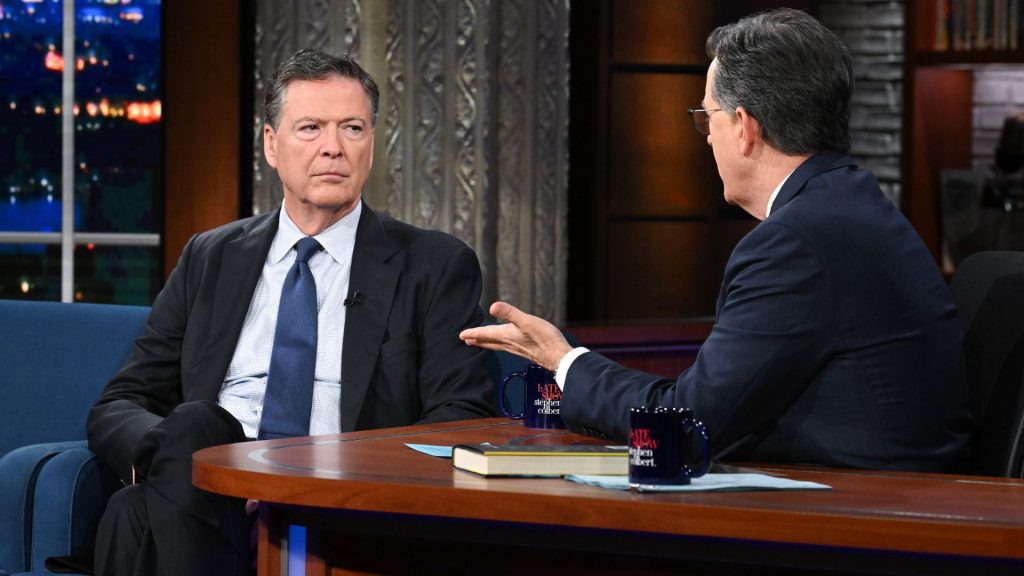After Comey’s indictment, Trump aims for other enemies

Former FBI director James Comey’s indictment signals a new phase in President Donald Trump’s quest for retribution against his perceived enemies. Long a prolific filer of civil litigation, Trump is now directing federal prosecutors to pursue criminal charges against those he believes have wronged him.
A federal grand jury in Virginia accused Comey of lying to Congress and obstruction on Thursday, less than a week after Trump used a social media post to order Attorney General Pam Bondi to charge Comey, as well as Sen. Adam Schiff, D-Calif., and New York State Attorney General Letitia James.
“JUSTICE MUST BE SERVED,” Trump wrote, “NOW!!!”
No other president in modern history has publicly demanded prosecutions of his opponents, and Justice Department officials have long touted their independence from the political goals of the White House. Trump, known for disregarding long-established norms in the American presidency, is attempting to use the Justice Department for his political ends in a way that has not been seen at least since the Watergate scandal of the early 1970s.
“It’s a move worthy of Alice in Wonderland, where the Red Queen demanded sentencing first and the verdict afterwards,” Joyce Vance, who was the U.S. attorney for the Northern District of Alabama during the Obama administration, wrote on Substack. “Trump wants prosecutions regardless of the evidence, or even of whether a crime has been committed.”
On Thursday, hours before Comey’s indictment was announced, Trump mused about bringing charges against more of his antagonists, including billionaire George Soros and Democratic donor and LinkedIn co-founder Reid Hoffman. Standing by Trump in the White House, Bondi seemed to concur.
“Everything,” she said, is “on the table.”
New US attorney signs Comey’s indictment
Just last week, U.S. Attorney Erik Siebert of the Eastern District of Virginia declined to prosecute either Comey or James, who angered Trump by bringing civil fraud charges against his family business.
Trump publicly criticized the decision and said he wanted to remove Siebert, whom he had appointed to the position earlier this year. Siebert, a career federal prosecutor, resigned. Trump, however, wrote on his Truth Social platform, “He didn’t quit, I fired him!!”
Trump replaced Siebert with Lindsey Halligan, a White House aide and former personal lawyer of the president’s who had no experience as a prosecutor. The appointment raised concerns because the Eastern District of Virginia, based just outside Washington, D.C., often handles high-profile terrorism and national security cases.
Three days after she took over, Halligan signed the two-page indictment against Comey.
“Nothing says selective or vindictive prosecution quite like firing a highly regarded career federal prosecutor who declined to prosecute a case and replacing him with a rubber stamp,” wrote former prosecutor Vance, now a law professor at the University of Alabama. “She handled insurance claims before joining Trump’s legal team during the Mar-a-Lago classified documents investigation. Putting someone so unqualified into such an important position seems to signal that Halligan is there to do a job — prosecute the president’s enemies.”
Defenses used, rarely successful
Comey may mount a defense claiming selective prosecution or vindictive prosecution. However, those efforts are rarely successful.
A landmark 1996 case from the Supreme Court, United States v. Armstrong, set a high bar to successfully use the selective prosecution defense. The defendant must show that he was singled out from others who committed similar offenses but who were not prosecuted. He must also prove that the prosecution was motivated by discriminatory reasons.
To use the vindictive prosecution defense, the defendant needs to prove that prosecutors retaliated against the defendant for exercising a right, such as using freedom of speech to critique a politician.
Vance suggested Comey might have a strong argument, however.
“It’s a dangerous moment, with a president hell bent on personal revenge seeking to corrupt the Justice Department to obtain it,” she wrote. “But ironically, by demanding the prosecutions, Trump may have undercut any possibility of success by providing the people on his ‘enemies list’ with a built-in defense.”
Trump celebrated Comey’s indictment with posts on Truth Social. “JUSTICE IN AMERICA!” he wrote.
Comey released a video statement in which he declared his innocence and touched on the theme of political vengeance through prosecution.
“We will not live on our knees, and you shouldn’t either,” Comey said.
“Somebody that I love dearly recently said that fear is the tool of a tyrant, and she’s right,” he added. “But I’m not afraid, and I hope you’re not either.”
The post After Comey’s indictment, Trump aims for other enemies appeared first on Straight Arrow News.





